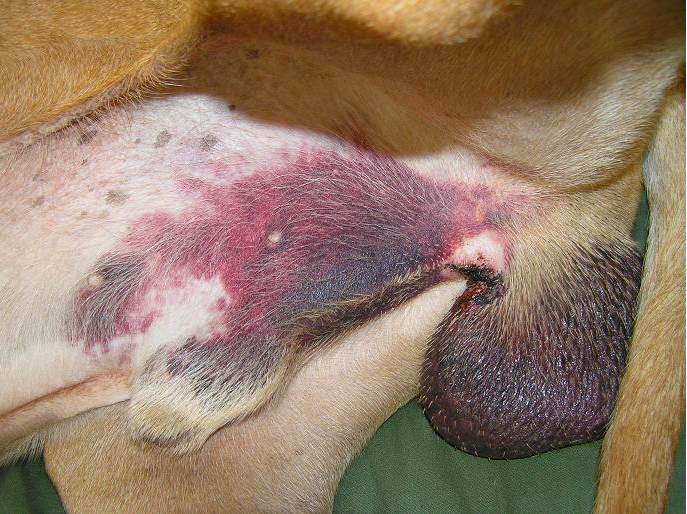Contents
Von Willebrands Disease, codenamed vWD, is a kind of inherited bleeding disorder similar in nature to hemophilia in human beings. The disorder is due to the deficiency of a protein that helps platelet in the formation of blood clots. The more specific name of this protein is von Willebrands factor antigen.
Dog Breeds Affected by this Disease
Almost all types of dogs, including those of mixed breed, are affected by this disease. Even though Dobermans are primarily connected, in most cases they remain clinically undiagnosed since these dogs are usually carriers and there is hardly any kind of bleeding evidence. Genetic factors primarily decide the occurrence of Von Willebrands Disease in German Shepherd dogs as well as in dog breeds like Scottish Terriers and Shetland Sheepdogs. The list continues with Chesapeake Bay Retrievers, Standard Poodles, German Short-haired Pointers, and Golden Retrievers.
Signs and Symptoms of Von Willebrands Disease

Unless there’s prolonged bleeding post-injury or trauma, this disease remains unnoticed. Hemorrhage cases are common too – like bleeding from the nose, urinary bladder, vagina, or the mucous membranes of the oral passage. Some canine species might exhibit the disease through blood in stool or urine. Some other symptoms are bleeding gums or occasional limping (due to bleeding joints) similar in nature to arthritis. If the hemorrhage situation aggravates, it might even lead to death. Female dogs might face excessive bleeding after giving birth to a litter. Even though the disease is not fatal by itself, it might turn fatal due to bleeding following surgery or in case of an accident.
How can vWD be Diagnosed?
Von Willebrands Disease can be screened by a screening test called Buccal Mucosal Bleeding Time. The veterinary surgeon checks the time of bleeding through this test. Prolonged duration surely points out that there is a grave protein deficiency in the canine breed. Even the percentage of Willebrands protein in blood can be checked. An accurate measurement can suggest whether the canine species will be a carrier or will be affected.
As a pet owner, you should always take into account bleeding time if there’s an injury. In case you find bleeding is disproportionate (crossing the normal time frame) you need to consult your vet.
Treatment for Von Willebrands Disease
First point to note is that Von Willebrands Disease is not a curable one, but definitely, the situation can be brought under control by proper medical supervision under a vet doctor. In emergency situations, blood or fresh frozen plasma transfusion is the savior. If your German Shepherd is facing a hemophiliac episode, transfusion is the ideal treatment. In case the German Shepherd dog is thyroid deficient the animal needs hormone replacement therapy. If vWD occurs late in hypothyroid German Shepherds, thyroid hormone supplementation can bring an effective treatment in alleviating the disease.
Minor instances of bleeding can be managed by the application of prolonged pressure on the wounded area. Veterinary care like sutures or cautery can also be applied depending on the severity of the wound.
The donor dog can be treated with a drug called DDAVP (Desmopressin Acetate) in order to raise the level of Willebrands protein factor so that the recipient dog benefits during the transmission process. Canine response to DDAVP is varied; some dogs might not respond to the drug administration. The long-term effect of this drug is still under clinical scrutiny and debate.
Genetic counseling can prevent the transmission of the disease from parent dogs to offspring. Before breeding, you should test the Willebrands factor for both the male and female dogs. Carrier dogs should never be bred with a normal ones.
Last but not the least, injury prevention is the ultimate cure. Prevent your pets from playing hard and rough with other dogs and never allow chewing on sharp bones or sticks. When a vWD dog is suffering from bleeding gums it needs to be fed soft foods. If the dog needs surgery, the veterinary surgeon will take the required precaution to minimize bleeding just after surgery.
Medications to Avoid in vWD
To check the bleeding crisis, certain medications need to be avoided. They are Ampicillin, Antihistamines, Aspirin, Heparin, Ibuprofen, Oestrogens, Penicillin, Phenothiazine tranquilizers, Phenylbutazone, Sulphur-based antibiotics, and Theophylline. Over-the-counter medications can be administered under vet care. It has been seen that dogs with this disease can lead a perfectly normal life with proper care and treatment.
Give vWD Dog a Proper Living Environment
The environment also matters, in the sense that bleeding episodes can get aggravated if there’s some other illness and physical or emotional stress. Separation anxiety can play havoc because of the excessive emotional pain – it is thus better to keep a vWD dog always in human company. Avoid over-exercise or any kind of physical rigor.

 Exocrine Pancreatic Insufficiency in German Shepherds
Exocrine Pancreatic Insufficiency in German Shepherds